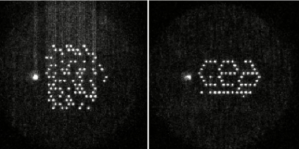The Partners aim to accelerate quantum computing advancements in Korea and foster Daedeok Quantum Cluster as a hub of the global quantum ecosystem
Paris, France and Dajeon, Korea, February 1st,2023 – Pasqal, the leader in neutral atom quantum computing, announces a significant partnership with the Korea Advanced Institute of Science and Technology (KAIST) and theCity of Daejeon. This collaboration marks a crucial step in Pasqal’s strategy to foster developments in quantum science and technology around the globe, and in Daejeon City’s ambition to nurture a leading quantum ecosystem in Daedeok Quantum Cluster.
A Convergence of Quantum Efforts
The agreement aims to enhance the quantum ecosystem in Korea, with each party contributing unique strengths.
Building on successful commercial and technical agreements since 2021 with leading Korean enterprises and universities, PASQAL recently established its local subsidiary aiming to bring to Korea its world leading expertise in quantum computing and related services, research and development (R&D), and industrial manufacturing skillset, as evidenced by the HPCQS program in Europe1.
KAIST has world-renowned scientific and technological researchers in the quantum field, including Professor Jaewook Ahn who serves as a scientific advisor to Pasqal, and will continue to nurture master’s and doctoral-level talents through its “Quantum Graduate School” opened last year.
The city of Daejeon plans to establish an organic cooperation system with related research institutes, companies, and universities in the region, including KAIST, to provide necessary support in accordance with relevant laws and regulations to help PASQAL successfully develop its activities in Daedeok Special Economic Zone, to solidifyits position as a leading quantum cluster in Korea.
Enhancing Korea’s Quantum Ecosystem
Pasqal brings comprehensive capabilities spanning hardware development, software control, and application solutions. Professor Ahn is renowned for his expertise in neutral atom quantum computing, quantum control, terahertz spectroscopy, and optics, with a particular focus on Rydberg atom graphs for quantum computing. This joint effort aims to significantly advance knowledge and tools in quantum computing, strategically benefiting both parties and contributing to the growth of Korea’s quantum ecosystem.
In April last year, Daejeon signed a business agreement with 10 Korean quantum-related organizations to build the Daedeok Quantum Cluster, and is jointly promoting projects such as technology development, infrastructure construction, human resource training, and technology commercialization.
Jang Woo Lee, Mayor of Daejeon Metropolitan City, emphasizes the local impact: “Daejeon’s collaboration with Pasqal and KAIST is a strategic move towards establishing our city as a central quantum hub. This partnership will catalyze technological advancements and economic growth, positioning Daejeonas a key player in the global quantum landscape.”
Georges-Olivier Reymond, CEO of Pasqal, comments on the global strategic direction: “The collaboration between Pasqal, KAIST, and Daejeon City symbolizes our global approach to quantum innovation. It allows us to integrate our advanced quantum computing technologies with Korea’s thriving scientific community, enhancing our global research network and contributing to worldwide quantum progress.”
Kwang Hyung Lee, President of KAIST, focuses on the academic and research implications: “Our partnership with Pasqal and Daejeon City enhances KAIST’s quantum research capabilities. It creates new opportunities for our students and researchers to engage in cutting-edge quantum projects, contributing to Korea’s growing stature in the quantum field.”
Building a Global Quantum Network
This new partnership not only solidifies PASQAL’s commitment to quantum research and development but also plays a pivotal role in expanding its global reach, linking major quantum ecosystems in Europe, NorthAmerica, and Asia through strategic hubs in Paris, Sherbrooke, and Daejeon. Pasqal has experienced the incredible growth potential of ecosystems when the public sector commits to fostering quantum technology, first in France, then Canada, and now in Korea. There will be a major benefit of linking the three great intellectual hubs of Paris, Sherbrooke and Daejeon.
Professor Jaewook Ahn of KAIST emphasizes the long-standing collaboration with PASQAL: “I am confident that this partnership will further enhance and deepen the personal and professional bonds between the three participants in all aspects including scientific, industrial, and government collaboration.”
Roberto Mauro, General Manager for Korea at PASQAL, highlights the businessand operational aspects: “LeadingPASQAL’s operations in this tripartite partnership represents an exciting opportunity to merge international business strategies withlocal quantum research initiatives. Our presence in Daejeon strengthens our commitment to advancing quantum technologies in Koreaand beyond.”
About Pasqal
Pasqal a leading Quantum Computing company that builds quantum processors from ordered neutral atoms in 2D and 3D arrays to bring a practical quantum advantage to its customers and address real-world problems. Pasqal was founded in 2019, out of the Institut d’Optique, by Georges-Olivier Reymond, Christophe Jurczak, Professor Dr. AlainAspect, Nobel Prize Laureate Physics, 2022, Dr. Antoine Browaeys, andDr. Thierry Lahaye. Pasqal has secured more than €140 million in financing to date. To learn more about PASQAL, visit www.pasqal.com
(1) HPCQS is an open and evolutionary infrastructure that aims at hybridizing classic HPC with Quantum; Computers and who selected PASQAL’s technology for their first installation. In the context of the SuperComputing 2023 conference in Denver (SC23), GrandEquipement National de Calcul Intensif(GENCI), Commissariat à l’énergie atomique et aux énergies alternatives(CEA), Forschungszentrum Jülich(FZJ), and PASQAL demonstrated progresses in the framework of theHPCQS. Indeed, HPC-Quantum Computing applications in finance, pharma, and energy are leveraging the upcoming PASQAL quantum computers that are currently being installed at the supercomputing centers CEA/TGCC(France) and FZJ/JSC (Germany), providing already concrete results.

